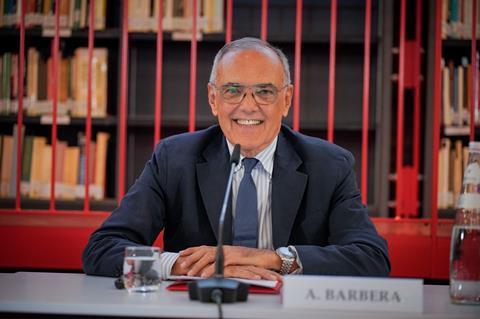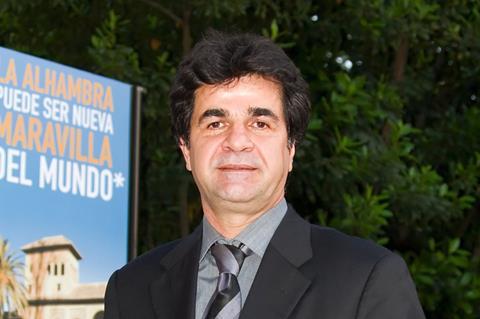
Venice Film festival artistic director Alberto Barbera unveiled an enticing line-up on Tuesday, festooned with the work of A-list auteurs and red carpet stars.
He talks to Screen about his ever-increasing negotiating power, what he can do to support Iranian filmmakers, and what festivalgoers can expect from this year’s event.
The Venice-Netflix relationship is a strong one. Has this led to a privileged position in terms of having first choice over its films? Does this also help in negotiating with the studios?
We were the first festival to invite Netflix films into competition. This gives us first choice over films being released by Netflix, at least for the ones that are ready in time for Venice. Overall, this has strengthened the festival. It has strengthened our selection process and allowed us to offer up premieres of extraordinary films internationally. The fact there are four Netflix films in the running this year is simply a culmination of the ongoing development process of past years, not to mention that Netflix has become one of the biggest producers of a certain type of cinema.
Netflix has a very important investment capacity which translates into great attractiveness for the directors. The studios have in large part lost some of this attractiveness. Very few Hollywood studios can enjoy the freedom Netflix has, nor can they match the level of investments that Netflix has the potential to carry out.
It’s not so much that we’re looking to privilege Netflix, it’s simply that Netflix has become one of the biggest players on an international scale today.
Are there any films you wanted in competition but couldn’t get this year?
The main film we had really hoped to see that unfortunately was not ready in time was [Steven] Spielberg’s new movie [The Fabelmans] that is premiering in Toronto.

You have selected four Iranian films throughout the selection and said you received “dozens” of submissions. Tell us more about that.
We received an unbelievable number of submissions from Iranian filmmakers, dozens of them. It’s been incredible, especially when one thinks of the extremely complex political and social environment in Iran and the fierce social repression on filmmakers. But as often happens, the most difficult moments are when directors are able to bring out the best in themselves and express their finest art using metaphors through which they narrate the complexity of the situation that surrounds them.
It’s a very particular, important phenomenon and we need to pay attention to it, particularly in light of the growth and renewal of Iranian cinema, and all the new directors and screenwriters that are emerging.
But we give everyone equal attention, and the choices we make are purely aesthetic and not geopolitical ones. We do not privilege certain countries or certain types of cinematography. We see everything. We see 2,000 [feature] films a year. Obviously the opinions and choices are personal but all the choices are made on a purely aesthetic basis.
How much contact have you had lately with Jafar Panahi?
We haven’t had direct contact with Panahi, but we have kept in touch through his sales agent [Celluloid Dreams’ Hengameh Panahi] who is Iranian and has been based in Paris for the past 30 years. We have an excellent collaborative relationship with her and liaise with her every year. Every year she proposes some very strong films. She keeps in contact with his relatives and then reverts back to us.
We saw the film and decided to invite the film to participate well before he got arrested again. Much later, we got the news he had been taken into custody. I want to point this out because it’s important it be understood that this was not a political decision. Even so, we will do everything in our power with the limited instruments we have to try and combat what happened to him.
Will you be holding any special initiatives this year, particularly in relation to the situation in Ukraine and in Iran?
We haven’t yet formally decided what we’re going to do. We’re still evaluating what initiatives we can take during this edition of the Venice Film Festival. One for sure will be dedicated to the war in the Ukraine, while the other will be in support of the Iranian directors. We have to understand what we can do, what we are able to do, and what action we can take that is most effective in terms of supporting them. We have not decided on this yet. We will discuss it with their entourage, and as soon as we have decided we will announce it.
What Covid precautions will be in place this year? Will the barrier still be in place on the red carpet or does such a starry line-up demand the public be able to see that red carpet?
No restrictions are going to be in place. This year, all regulatory health barriers have been removed. There is no limit to screening hall capacity or other limitations. We will however invite everyone to behave in the most prudent way possible, to wear masks indoors, even if we cannot actually oblige people to do so because the government regulations are no longer in place. We hope for an ongoing lowering of the Covid contagion curve in the months ahead of Venice so as to offer those present a risk-free experience.
The barrier in front of the red carpet will no longer be there permitting street-level public views of it.
What do you make of the phenomenal growth in the Italian industry with the number of titles released over the past year doubling to 250?
I’m very attentive to what goes on in the industry and in doing so I listen very carefully to what producers and distributors tell me. And they are flagging the risk of there being a bubble in the sector.
Everyone in the sector today is working non-stop. There’s been a mad rush to produce and the result has been quantity perhaps at the expense of quality in terms of films. This, in my opinion, is a terrible mistake. The situation needs to be addressed because if we aim to regain the attention and the affection of the Italian public, particularly in relation to national cinema, the only instrument we have is quality. The cinema-going public exists, because when we have attractive, well-made American films released, the theatre halls are full. On the other hand, when you have a qualitatively weak and small Italian production, very few people will go and see it. We have to be careful, if we want to reattract the public. Quality is really the only instrument we have.
At the end of the press conference yesterday, you thanked Biennale president Roberto Cicutto for his “defence from possible pressures”. What did you mean by that?
Since I started working at the Biennale in 1999 some 20 years ago, the president has always had the role and task of defending the artistic director in terms of autonomy, independence and decision-making from possible interferences or pressure. Years ago, these used to be quite routine. Venice had become a bit of a joke in the ’70s and in the ’80s in that it was a well-known arena of political interference and pressure. When it was transformed into a private foundation in 1998 this all changed, and directors were able to work in complete autonomy. I was simply thanking the president who took over this role two years ago and anyhow carried on with the mission of protecting the director’s autonomy and decision-making. Having said this, I must also point out that I have never suffered or been exposed to any type of pressure in carrying out my work.
The Venice Film Festival runs August 31 - September 10, 2022.

























No comments yet